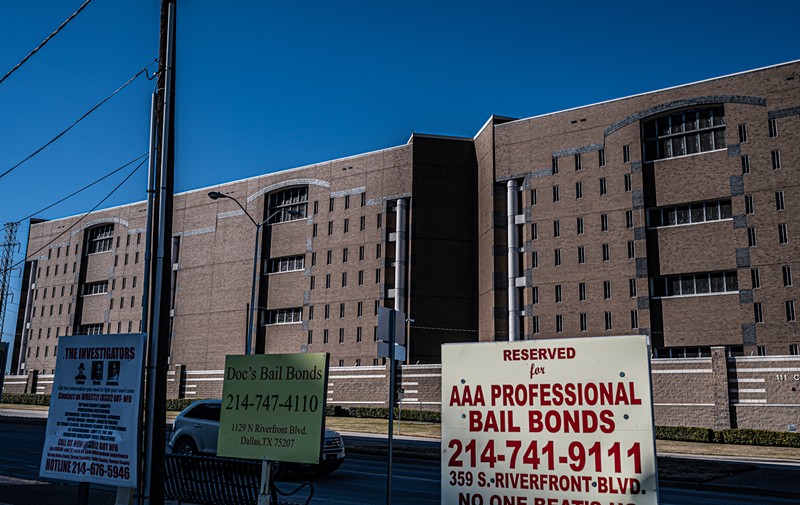“The Dallas County Jail has had significant issues for a number of years,” Dean Malone, one of the family’s attorneys, said. “Unfortunately, those issues have resulted in the death of several people, including the young man in this case. There’s really no excuse for him being held in the jail and not receiving mental health treatment that he needed.”
French had a history of mental illness and time in the Dallas County Jail. Before 2020, the last time French was in the jail was in 2018, when a physician noted he might need a competency evaluation and court-ordered medication. The suit points this out as evidence that the county knew it could order French to take medicine for his mental health. Back then, he was diagnosed with unspecified psychosis after reportedly hearing nonexistent voices and seeing things that weren’t there.
Fast forward to two years later on March 7, 2020. French’s grandmother found him sleeping on her front porch. His grandmother didn’t want him there because of his mental health issues, so she called the police. “Paul’s family wanted to get help for Paul, not for him to be arrested, needlessly suffer, and die in the county jail,” the lawsuit said. During the arrest, an officer struck French with his fist about 10 times while trying to detain and subdue him. The suit said this could have exacerbated French’s poor mental state.
French was assessed by a jail nurse that day. He reported hearing voices and hallucinating. A few months later in June, a court determined evidence existed to support a finding that French was incompetent to stand trial. The court decided no hearing was necessary and that French was to be committed to an inpatient mental health facility designated by North Texas State Hospital. He was supposed to be committed for up to 120 days with the goal of getting him competent to stand trial."There’s really no excuse for him being held in the jail and not receiving mental health treatment that he needed.” – Dean Malone, attorney
tweet this
He was put into Dallas County Jail custody solely for transportation to the inpatient mental health facility, but French never made it there. Instead, the county incarcerated him for over six months until his death in December 2020.
“If Paul had not died, he would have no doubt been incarcerated in the Dallas County Jail for some unknown, non-specified period of time, all while being incompetent, suffering delusions, hearing voices that were not real, seeing people who were not there, and attempting to kill himself,” the lawsuit said.
From that point forward to the time of his death, French would exhibit strange behavior, repeatedly refuse his medication and express suicidal thoughts. “Upon information and belief, these were needed mental health medications,” the lawsuit said. “Even so, and even though Paul was in a psychotic and delusional state, Dallas County failed to obtain an order for forced medication.”
On Nov. 27, 2020, a nurse assessed French for suicidal ideation and schizoaffective disorder. That day, French was naked, lying on the ground in his cell and saying he wanted to kill himself. He said he had a plan to do so but didn’t specify what the plan entailed. He told the nurse he was suicidal and overeating.
He was transferred to suicidal housing but continued to decline his medication. “There was little doubt that, if this continued, it would lead to serious injury or death,” the lawsuit said. “There were plenty of warning bells that should be going off, but Paul was stuck in the midst of inaction pursuant to county policy, practice, and/or custom,” the lawsuit said.
On Dec. 7, 2020, a professional counselor met with French for suicidal precautions. During this meeting, he said he was suicidal. He would be placed on suicide watch, but died the next day. It was only on the last day he was alive that a physician planned to file a compelled medications application for French to force him to take his medicine. “Unfortunately, this was far too late for Paul,” the lawsuit said. “This should have been done long before, and if so, upon information and belief, Paul’s life would have been saved.”
At 9:22 p.m. that night, nurses responded to French’s cell and saw a white foam coming from his mouth. His heart rate was 172. Some 21 minutes later, jail medical staff began administering CPR. They were not able to regain a pulse and French was pronounced dead at 10:55 p.m. at Parkland Hospital.
Dallas County jailers are required to check people on suicide watch every 15 minutes. This didn’t happen in French’s case, according to the lawsuit. The jailer who should have checked on French was the subject of an internal affairs investigation over the incident. It was alleged that the jailer had committed dereliction/neglect of duty and falsified reports. These charges were sustained after the investigation. In the falsified reports, the jailer claimed they had checked on French when they had not. The jailer was given a three-day suspension without pay after the investigation.
The Medical Examiner’s Office reviewed various forms of evidence to determine French’s cause of death, including surveillance video from the jail. In the video, French can be seen making repeated trips to the sink and toilet unit in his cell. An autopsy determined that French died of acute water intoxication.
“Because it is unknown whether the water intoxication was a result of intentional self harm or due to psychosis, the manner of death is undetermined,” the medical examiner’s autopsy report said.
The Dallas County Sheriff’s Department, which runs the jail, filed a custodial death report with the attorney general of Texas regarding French’s death. In the section of the report that asks if any mental health problems were exhibited, the answer provided was “no.” It also falsely said that French had not made any suicidal statements and had not exhibited any medical problems. “It appeared that Dallas County was attempting to cover its liability tracks,” the lawsuit said. Officials at the county jail did not respond to a request for comment about the suit.
Malone said there didn’t seem to be any policy in place to monitor French’s water usage. “No one will ever know what was in his mind,” Malone said. “It was really just the culmination of a lot of events."
Last Tuesday, the Dallas County Commissioners Court approved the settlement. “While we’re glad to see that Dallas County has resolved the case, monetary resolution really can’t bring any of these people back,” Malone said.













